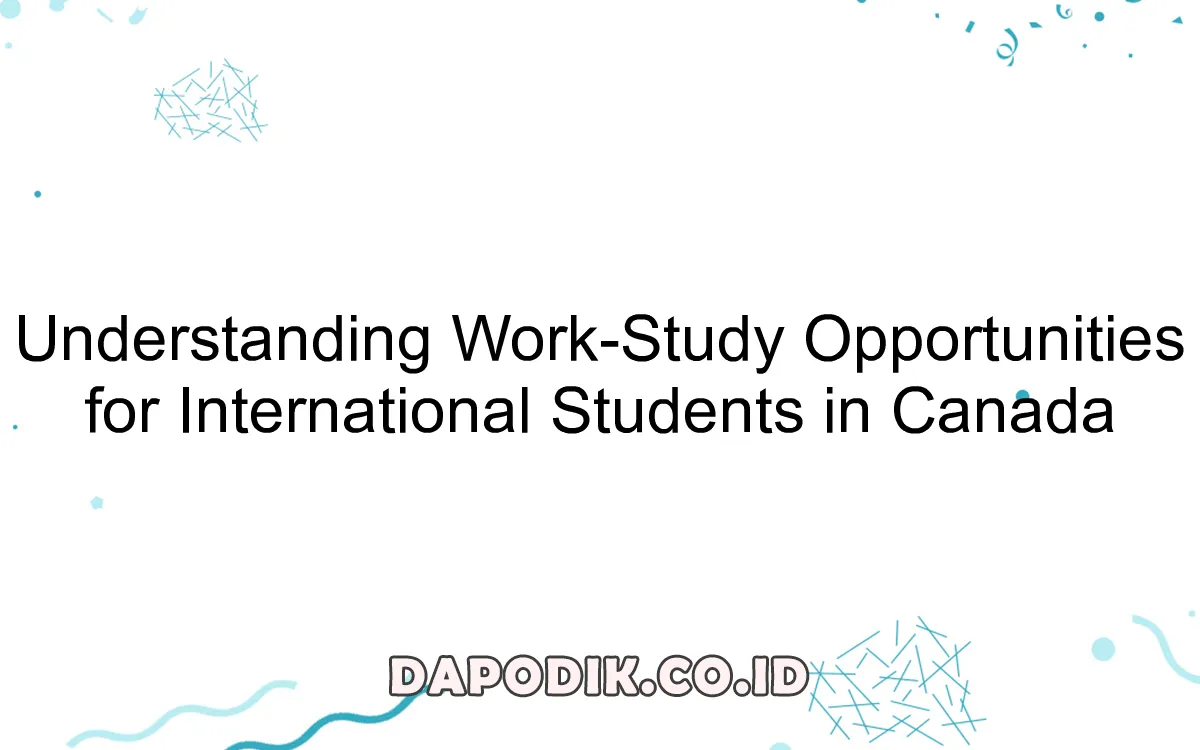Understanding Work-Study Opportunities for International Students in Canada
Are you an international student planning to study in Canada? If so, it’s important to understand the work-study opportunities available to you. This article delves into the various ways international students can work while studying in Canada, including on-campus jobs, off-campus work permits, and co-op programs. Keep reading to learn about the options that can help you gain practical experience and support your financial needs during your studies.
What is Work-Study?
Work-Study programs provide international students in Canada with valuable opportunities to work and gain experience while pursuing their studies. These programs are designed to help students meet their financial needs, develop new skills, and engage with the local community. Work-Study programs are typically available at colleges and universities across Canada, offering a wide range of employment options on and off campus.
Work-Study programs are regulated by the Canadian government and have specific eligibility requirements. International students must have a valid study permit, be enrolled in a designated learning institution, and meet certain academic criteria to participate in these programs. It’s important for students to check with their respective institution’s international student services office to determine their eligibility and application process.
Participating in a Work-Study program can be highly beneficial for international students. Here are some key advantages:
- Financial support: Work-Study opportunities provide students with an additional source of income to help cover their educational and living expenses while studying in Canada.
- Professional development: Through Work-Study positions, students can gain practical experience related to their field of study, allowing them to develop valuable skills and enhance their resumes.
- Networking: Working on campus or in the local community provides students with opportunities to connect with different people, build professional networks, and explore potential career paths.
- Work-life balance: Work-Study programs in Canada prioritize students’ academic success and limit the number of hours they can work per week, ensuring a healthy balance between work and study commitments.
It is important to note that the availability of Work-Study programs and the number of positions offered may vary among institutions. Competition for these positions can be high, so it’s advisable for international students to apply early and prepare a strong application.
Overall, Work-Study programs in Canada present excellent opportunities for international students to gain valuable work experience, earn money, and enhance their academic journey. It is a reflection of Canada’s commitment to supporting international students and providing them with holistic educational experiences.
Eligibility and Application Process

When it comes to understanding work-study opportunities for international students in Canada, it is important to be familiar with the eligibility criteria and application process. This information will help ensure that you can make the most of the available opportunities and enhance your overall study experience.
Eligibility for Work-Study Programs
Canadian universities and colleges offer work-study programs to provide financial support and valuable work experience to international students. However, eligibility requirements may vary from institution to institution. Generally, to be eligible for work-study opportunities, students must:
- Be enrolled in a full-time program of study at a recognized educational institution in Canada
- Hold a valid study permit
- Demonstrate good academic standing
- Have satisfactory language proficiency
- Meet any additional specific requirements set by the institution
Application Process
The application process for work-study opportunities typically involves the following steps:
- Research: Start by researching the work-study programs available at your institution. Each program may have different requirements, benefits, and job placements.
- Prepare Documents: Gather all the necessary documents, which may include your resume, cover letter, transcript, and reference letters.
- Apply: Submit your application online or follow the specific instructions provided by your institution. Make sure to meet the application deadlines and provide all required information.
- Interview: If shortlisted, you may be interviewed by the prospective employer. Prepare for the interview by researching the position and showcasing your relevant skills and experiences.
- Placement: If selected, you will receive a work placement. Be sure to review the terms and conditions, work hours, and compensation details.
- Work-Study Period: During your work-study period, make the most of the opportunity to gain valuable work experience, build your network, and develop new skills.
Benefits of Work-Study
Participating in a work-study program can bring numerous benefits to international students, including:
- Financial Support: Work-study programs provide a means for students to earn income to support their educational and living expenses.
- Professional Development: The work experience gained through these programs can enhance your resume and future career prospects.
- Networking: Working on campus allows you to connect with professionals, faculty members, and fellow students, expanding your network.
- Integration: Engaging in work-study can help you integrate into the Canadian education system and culture more effectively.
- Time Management: Balancing work and study responsibilities can improve your time management skills, which are crucial for academic success.
Remember, each institution may have specific guidelines and regulations regarding work-study programs. It is essential to review the specific details provided by your institution and follow their instructions.
Benefits of Work-Study Programs
Work-study programs provide great opportunities for international students in Canada to gain valuable work experience, enhance their skills, and manage their financials while studying. These programs offer several benefits that not only assist students in their educational journey but also help them prepare for their future career.
Financial Support
One of the significant advantages of work-study programs is the financial support they provide to international students. These programs allow students to earn income through part-time jobs while studying, helping them cover their living expenses, tuition fees, or other educational costs. This financial support can greatly reduce the burden of financial stress on students and enable them to focus more on their studies.
Professional Development
Participating in work-study programs allows international students to gain practical work experience in their field of interest. This experience not only enhances their resumes but also helps them develop essential professional skills, such as communication, time management, teamwork, and problem-solving. By actively engaging in a work-study program, students have the opportunity to apply their theoretical knowledge in real-life situations and develop a solid foundation for their future careers.
Networking Opportunities
Work-study programs often expose students to a diverse range of individuals, including professors, professionals, and fellow students. These interactions provide valuable networking opportunities that can be beneficial for future career prospects. Building connections and establishing relationships with professionals in the industry can open doors to potential job opportunities, internships, and mentorship, allowing students to gain insights and guidance from experienced professionals.
Cultural Integration
Engaging in a work-study program allows international students to immerse themselves in the Canadian work culture and society. By working with local colleagues and interacting with Canadian residents, students can develop a better understanding of Canadian customs, traditions, and societal norms. This cultural integration not only enriches their overall educational experience but also prepares them for successful integration into the Canadian workforce after graduation.
Enhanced Language Skills
For international students whose first language is not English, work-study programs offer an excellent opportunity to improve their language skills. Constant communication and interaction with coworkers and customers help students practice and refine their English language abilities, including speaking, listening, reading, and writing. Improved language skills not only benefit their work experience but also contribute to academic success and confidence in everyday life.
In conclusion, work-study programs provide numerous benefits for international students in Canada. By offering financial support, professional development opportunities, networking possibilities, cultural integration, and enhanced language skills, these programs play a vital role in helping students succeed academically and professionally, making them a worthwhile endeavor for any international student pursuing education in Canada.
Conclusion
Overall, work-study opportunities in Canada provide international students with valuable experiences, financial support, and exposure to the Canadian job market. Through these programs, students can gain practical skills, enhance their resumes, and supplement their income while studying. It’s important for international students to understand the eligibility criteria, work restrictions, and application process to make the most of these opportunities.

Posting Komentar untuk "Understanding Work-Study Opportunities for International Students in Canada"
Gambar ataupun video yang ada di situs ini terkadang berasal dari berbagai sumber media lain. Hak Cipta sepenuhnya dipegang oleh sumber tersebut.